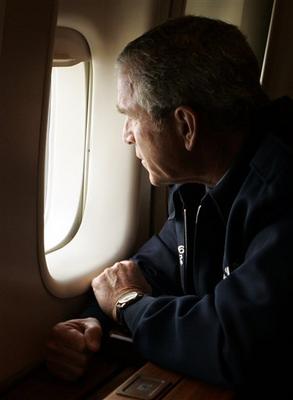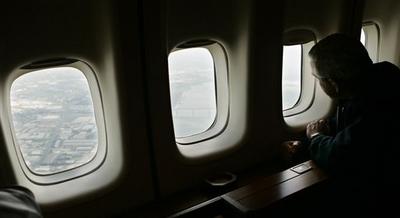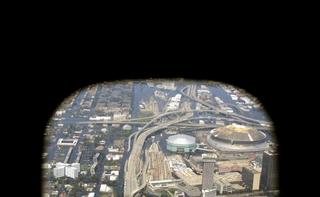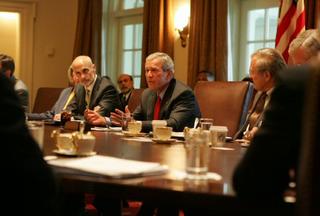KATRINA / Was Bush prepared for Katrina?
 President Bush flew over the ravaged city and parts of Mississippi’s hurricane-blasted coastline in Air Force One. Turning to his aides, he said: "It’s totally wiped out. ... It’s devastating, it’s got to be doubly devastating on the ground."
President Bush flew over the ravaged city and parts of Mississippi’s hurricane-blasted coastline in Air Force One. Turning to his aides, he said: "It’s totally wiped out. ... It’s devastating, it’s got to be doubly devastating on the ground.""We’re dealing with one of the worst national disasters in our nation’s history," Bush said later in a televised address from the White House, which most victims could not see because power remains out to 1 million Gulf Coast residents.
The federal government dispatched helicopters, warships and elite SEAL water-rescue teams in one of the biggest relief operations in U.S. history, aimed at plucking residents from rooftops in the last of the “golden 72 hours” rescuers say is crucial to saving lives. [MSNBC]
As Katrina forced President Bush to cut short his vacation, the White House is facing a perfect storm of trouble at home and abroad.
By Richard Wolffe and Holly Bailey
Newsweek
On Tuesday, President Bush called an abrupt end to his five-week “working vacation” at his Texas ranch and announced he would return to the White House two days early to oversee federal response to the devastation of Hurricane Katrina. “These are trying times for the people of these communities,” Bush said Tuesday during a visit to a naval base in San Diego. “We have a lot of work to do.”
For the White House, it was interesting timing. Over the last month, administration officials have deflected criticism of Bush’s monthlong stay at his Texas ranch by making the case that technology has made it possible for Bush to run the country from anywhere, even the so-called Western White House. Indeed, the Bush ranch is equipped with highly secure videoconferencing equipment and phones, and, according to White House officials, Bush has made use of them just about every day this month to talk to senior aides back in Washington and other administration officials scattered throughout the country.
 Yet Bush usually hasn’t had to go far to reach his top aides. For the last month, Karl Rove, his closest political adviser, and Joe Hagin, Bush’s deputy chief of staff, have alternated turns living in a trailer just down the driveway from Bush’s main ranch house. Other officials have come to the ranch to meet with Bush face to face, including Secretary of Defense Donald Rumsfeld, Secretary of State Condoleezza Rice and Vice President Dick Cheney. All three visited Crawford to discuss war strategy with Bush earlier this month. In other words, Bush’s days in Texas aren’t all that different from his time in the Oval Office, top aides say. Vacation or not, Bush is always running the country no matter where he is. “When you’re president, you’re president 24/7,” White House Press Secretary Scott McClellan told reporters Wednesday.
Yet Bush usually hasn’t had to go far to reach his top aides. For the last month, Karl Rove, his closest political adviser, and Joe Hagin, Bush’s deputy chief of staff, have alternated turns living in a trailer just down the driveway from Bush’s main ranch house. Other officials have come to the ranch to meet with Bush face to face, including Secretary of Defense Donald Rumsfeld, Secretary of State Condoleezza Rice and Vice President Dick Cheney. All three visited Crawford to discuss war strategy with Bush earlier this month. In other words, Bush’s days in Texas aren’t all that different from his time in the Oval Office, top aides say. Vacation or not, Bush is always running the country no matter where he is. “When you’re president, you’re president 24/7,” White House Press Secretary Scott McClellan told reporters Wednesday.So why is Bush going back to Washington now? When asked yesterday what Bush could do in Washington for hurricane relief that he couldn’t do from his Texas ranch, McClellan told reporters no less than five times that it was the president’s “preference” to return to the White House. Asked if the decision was more “symbolic” than logistical, McClellan said, “I disagree with the characterization.”
From the moment Katrina set aim for the Gulf Coast, White House officials have had two other storms on their minds: last year’s devastating tsunami, to which Bush was criticized for responding too slowly, and the political turmoil that Bush faces here at home over the war and the economy. Indeed, August has not been a good month for the Bush administration. White House officials had hoped to capitalize on a slow news cycle to tout the president’s second-term agenda and his accomplishments so far. Yet a spike in casualties in Iraq this month has deepened already widespread worries about the war. That bad news was only compounded by the stampede in Baghdad on Wednesday that left more than 800 Shia pilgrims dead after rumors of a suicide bomber sparked panic.
That dismal news from Iraq, combined with rising gas prices here at home, has sent
 Bush’s poll numbers plummeting to new lows. An ABC News/Washington Post survey released Wednesday has Bush’s approval rating at 45 percent—down 7 points since January and the lowest every recorded this president by that particular poll.
Bush’s poll numbers plummeting to new lows. An ABC News/Washington Post survey released Wednesday has Bush’s approval rating at 45 percent—down 7 points since January and the lowest every recorded this president by that particular poll.Bush and other administration officials repeatedly say they don’t pay attention to polls, but they do admit paying close attention to the images of the war and the presidency that Americans see on TV. That’s partly why Bush abruptly called reporters to his ranch Sunday morning to make a statement about Hurricane Katrina as it inched toward the Gulf Coast states. The message: that Bush was ahead of the storm and would be there to respond to its certain devastation. It was in strong contrast to last December’s tsunami, when Bush didn’t make a public statement about the tragedy until three days later, well after the death toll had reached into the tens of thousands.
As Bush returns to Washington to deal with Katrina’s aftermath, it’s a chance for him to look presidential and to briefly turn public attention from a troubled war to the homefront. Already, the White House has promised to send billions of dollars in aide to the affected region, and tapping into the Strategic Petroleum Reserve is expected to shave a few cents off record-high gas prices.
Later this week, Bush is expected to travel to the affected region, where his poll numbers have taken a hit over concerns about the war. In Louisiana, more than a quarter of the state’s National Guard troops are currently in Iraq—a stat that had local officials concerned considering the role the guard typically plays in helping the state weather such storms. A Survey USA poll released earlier this month found Bush’s approval rating in Louisiana had dipped to 48 percent—down 5 points since July.
 Beyond the poll numbers, the Bush administration faces some immediate, urgent challenges—and serious questions about its response to the disaster. For all the president’s statements ahead of the hurricane, the region seemed woefully unprepared for the flooding of New Orleans—a catastrophe that has long been predicted by experts and politicians alike. There seems to have been no contingency planning for a total evacuation of the city, including the final refuges of the city’s Superdome and its hospitals. There were no supplies of food and water ready offshore—on Navy ships for instance—in the event of such flooding, even though government officials knew there were thousands of people stranded inside the sweltering and powerless city.
Beyond the poll numbers, the Bush administration faces some immediate, urgent challenges—and serious questions about its response to the disaster. For all the president’s statements ahead of the hurricane, the region seemed woefully unprepared for the flooding of New Orleans—a catastrophe that has long been predicted by experts and politicians alike. There seems to have been no contingency planning for a total evacuation of the city, including the final refuges of the city’s Superdome and its hospitals. There were no supplies of food and water ready offshore—on Navy ships for instance—in the event of such flooding, even though government officials knew there were thousands of people stranded inside the sweltering and powerless city.Then there’s the speed of the Bush administration’s response to such disasters. Just one week ago the White House declared that a major disaster existed in Louisiana, specifically most of the areas (such as Jefferson Parish) that are now under water. Was the White House psychic about the disaster ahead? Not exactly. In fact the major disaster referred to Tropical Storm Cindy, which struck the state a full seven weeks earlier. That announcement triggered federal aid for the stricken areas, where the clean-up had been on hold for almost two months while the White House chewed things over.
Now, faced with a far bigger and deadlier disaster, the Bush administration faces at least two difficult questions: Was it ready to deal with the long-predicted flooding of New Orleans? And is it ready to deal with the long-predicted terrorist attack that might some day strike another of our big cities?
© 2005 Newsweek, Inc.

<< Home